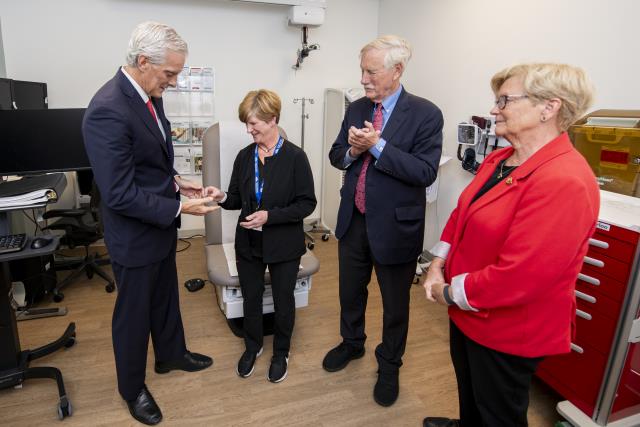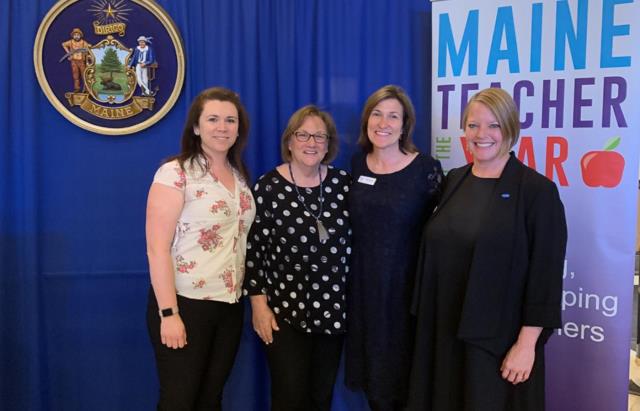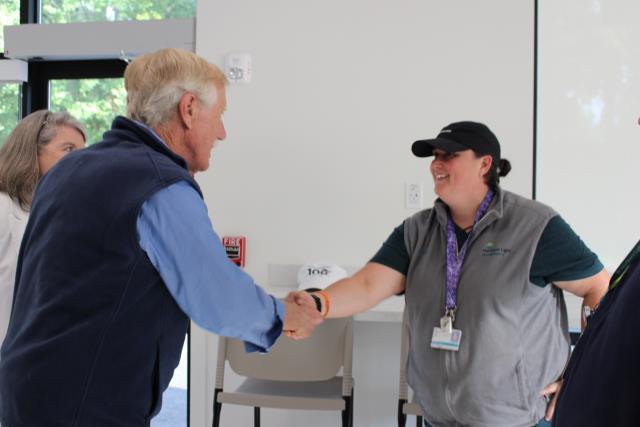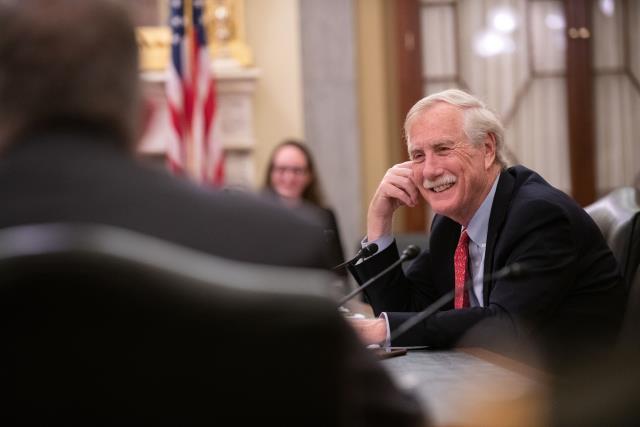Avoiding a Government Shutdown

At daybreak on Saturday, a government shutdown looked inevitable and the minority within the Republican caucus in the House looked to be in charge. But that all changed when the Speaker put a “clean” 45-day Continuing Resolution (“CR” in Washington speak) on the floor that continued current funding levels – which passed with more Democratic votes than Republican. Though this would put the Speaker’s job at risk, he seemed tired of being threatened and realized that a shutdown would not sit well with the country.
When the bill came over to the Senate in mid-afternoon, the issue became Ukraine—the only change in the bipartisan provision that had gotten overwhelming support the day before was the removal of an interim funding package for Ukraine This was a hard pill for those on both sides of the aisle who believe, as I do, that helping Ukraine resist Putin’s invasion is in our national interest as well as the right thing to do. After some heated debate, we decided that the shadow of a shutdown was not the time to resolve this question and that we would address it directly in the weeks ahead. We should never have gotten to the point of so much drama, so celebration isn’t the right tone, but given where we were late last week, I’ll take it. We got it done. The troops will be paid, the phones will be answered at Social Security and the IRS, the checks for government services will be sent out, Acadia will stay open, and we have another chance to get it right.
__________________________________________________________________
Showing the VA Director Maine's Veteran Facilities

Maine veterans, and their families, have led lives of sacrifice in service to our country. We all share an obligation to ensure these brave men and women can access their hard-earned benefits and healthcare.
That's why I invited Secretary Denis McDonough to Maine in August to visit our VA facilities and learn how state and community organizations are working in tandem with the VA to support our veterans and end veteran homelessness. During his visit, we discussed challenges facing our rural veterans, PACT Act implementation, and VA staffing shortages. We also kicked off the "No Homeless Veterans Challenge" in Portland with plans to house 100 veterans across the state in 100 days.
As Maine veterans transition to civilian life, we have a responsibility to make sure they are healthy and have access to sufficient resources for that smooth transition.
During the visit, I heard from Maine veterans that Congress and the VA need to do more to prevent scammers from taking advantage of vulnerable veterans when they are applying for their benefits. So when I got back to Washington, the Senate Veteran Affairs Committee (SVAC) went right to work. We sent a letter to Secretary McDonough urging the department to enforce existing protections for veterans filing for disability benefits. We also requested additional resources to punish those who try to scam veterans.
As Maine veterans transition to civilian life, we have a responsibility to make sure they are healthy and have access to sufficient resources for that smooth transition. I went to work with Senators Cramer, Shaheen and Rounds to introduce the TAP Promotion Act. This bipartisan bill would allow accredited representatives from Veterans Service Organizations (VSOs) to participate in Transition Assistance Program (TAP) classes to help transitioning servicemembers file Benefits Delivery at Discharge (BDD) claims, as TAP classroom instructors are not legally allowed to help veterans fill out benefits paperwork.
TAP is offered at over 300 installations around the world and helps prepare servicemembers for civilian life. Having an accredited representative physically present in TAP classrooms during VA briefings would create another bridge for servicemembers transitioning to veteran status.
Finally, in an effort to highlight September as Suicide Prevention Month, the Veterans' Affairs Committee held a hearing with officials on how to reduce the triggers of veteran suicide. I was joined by Representatives Pingree and Golden on a follow up letter to the Secretary requesting the VA fund and distribute gun lockboxes and safes that are proven to reduce the risk of suicide -- an idea we discussed during his visit. We owe it to our veterans to provide as many resources as possible so that they can live happy, healthy, productive lives after they transition out of service.
To learn more about my work to support veterans, you can listen to the August episode of my “Inside Maine” podcast where I discussed how we can continue to work together to provide for our vets.
You can listen to the episode here, learn more about Secretary McDonough’s visit here, or read my thoughts in the Piscataquis Observer on how we can better meet our commitment to veterans here.
Standing Strong to Support Older Maine People

We all know the saying that ‘an ounce of prevention is worth a pound of cure.’ That's why preventative care is a win-win for patients, family support systems, Medicare beneficiaries and taxpayers alike.
Across the nation over 3 million older people are treated in emergency rooms for fall injuries each year, and over 800,000 patients are hospitalized because of a fall injury. Additionally, the financial impact of treating falls related injuries costs the nation $50 billion annually for the effects of these falls.
The ‘Stand Strong’ legislative package I introduced this month will ensure older Maine people have access to preventative care like home modifications and telehealth accessibility —hopefully leading to less falls and injuries which are costly for the patient and taxpayers alike.
The Preventative Home Visits Act and the WELL Seniors Act. These bills would expand Medicare benefits to cover home modifications, ensure the accessibility of telehealth services and include comprehensive screenings during Medicare Annual Wellness Visits.
In fact, on a percentage basis, Maine leads the nation with the largest 65 and older population. According to the Centers for Disease Control (CDC), falls are the leading cause of injury for adults ages 65 years and older. In 2021, there were 325 deaths in Maine attributed to older adult falls and Maine ranked 8th highest in the nation per capita on the rate of deaths due to falls.
These changes are critically important for seniors that are unable to live at home independently or leave their residence without assistance. So much so that telemedicine has become an indispensable component of our health care system and a resource that many Maine people utilize. It lets rural families attend appointments more regularly, provides urgent care without the need for huge emergency room bills, and reduces potential exposure to disease for at-risk Maine people. It also allows Maine people to connect with professionals who can provide guidance and feedback on preventative home care measures like grab bars and railings. We need to do what we can to keep Maine people on their feet--and supporting them with both grab bars and expanded access to medical professionals is a good first step.
________________________________________________________________________
Providing Resources for Maine's Teachers

As the son of two public school teachers, I’m eternally grateful for the contributions of America’s educators. From the moment they walk into a classroom, Maine’s teachers lay the foundation for our children’s success and provide an invaluable, and often underappreciated, service to our communities.
So many of our public school teachers go above and beyond, often paying out-of-pocket for supplies. This month, I introduced the Educators Expense Deduction Modernization Act of 2023 to increase tax deductions for teachers that are buying items like pencils and paper for their classrooms.
The legislation would more than triple the amount educators can deduct from their taxes for out-of-pocket classroom expenses. Right now, the deduction maxes out at $300, but this legislation would bump the deduction up to $1,000 (and index it to inflation).
At the start of the school year, I also introduced the Supporting the Mental Health of Educators and Staff Act to increase access to mental health resources for educators and school staff.
Both of these bills are a great start to ensure we are doing everything we can to take care of our teachers and, in turn, our Maine students. I hope we can all take time to recognize the contributions of Maine educators, and educators across the nation, who devote their lives to teaching the next generation.
VA to Resume Reimbursing Maine Veterans’ Homes for Domiciliary Care

For decades, Maine Veterans’ Homes (MVH) has provided world-class care to our state’s veterans. They’ve worked hard to meet America’s commitment to those who served despite rising costs. Unfortunately, the Department of Veterans Affairs (VA) delayed reimbursements to MVH for over two years. This forced MVH to pay for the care costing approximately $130,000 per month and over $2.5 million since 2019. Veterans and their families also had to pay a portion out-of-pocket too. Over 130 MVH residents receive domiciliary care, 80% of whom are on Medicaid. The delayed reimbursements are unacceptable and it’s why the Maine congressional delegation has worked hard for many months to fix this problem.
Thankfully, the VA just announced that it would reimburse Maine Veterans’ Homes (MVH) for the costs of nursing home care for veterans with dementia. The rule would also retroactively reimburse MVH for costs associated to domiciliary care dating back to January 2021 when Maine’s congressional delegation’s initial law was passed.
This new ruling is a win for veterans across the state of Maine. It will ensure the federal government supports our veterans with all of the resources at our disposal so that older Maine veterans struggling to live independently can receive the care and support they earned on behalf of a grateful nation.
More information on this announcement can be found here.
Advocating for Maine’s Dairy Farmers

When consumers look at the decision between the many dairy-labeled products available at their local grocery stores, they may assume all options are nutritionally equivalent. Labeling plant-based alternatives as ‘milk’, ‘yogurt’, or ‘cheese’ is misleading to consumers and makes informed dietary choices more difficult.
Consumers deserve to clearly see the truth about the food they buy, and Maine's dairy farmers deserve a fair shot in a crowded marketplace. I’ve heard from Maine dairy farmers about how this unfair competition from imitation products have been harmful to their businesses and the dairy industry as a whole.
That’s because the Food and Drug Administration (FDA) allows non-dairy products to illegally use dairy terms to label their imitation products, most of which are nutritionally inferior to the real dairy foods they are trying to imitate. The words “milk,” “cheese,” and “yogurt,” to name a few, should be reserved only for products that are truly dairy-based.
So this month, Senator Collins and I wrote a letter to the FDA urging them to crack down on the mislabeling of dairy products. We need to make sure we’re protecting the farmers who are helping to deliver fresh and nutritional dairy foods to tables across Maine.
Learn more about our efforts to protect our dairy farmers here.
Happenings Around Town
One of my favorite parts of my job is traveling the state and meeting with all the good people who are working to make Maine an even better place to live. I’ve always found that one day of seeing is worth at least a hundred of reading, and over the past two months in Blue Hill, Otisfield, Mapleton, and more--and back to Washington--that was certainly the case.

Meeting officials from Northern Light Blue Hill Hospital
Touring the brand-new Northern Light Blue Hill Hospital, I got to see first-hand the incredible work of our state’s rural medical professionals. Thanks to their hard work and this state-of-the-art facility, Maine people on the Blue Hill Peninsula continue to have critical access to world-class healthcare.

Speaking on the CSC panel in Washington
Over the course of several years, the Cyberspace Solarium Commission (CSC) has proven that its report is not just sitting on a shelf collecting dust. We are meeting the urgent needs of American cybersecurity policy to protect infrastructure, invest in federal network security, work closely with the private sector, and punish threatening actors. This month, I sat on a panel with my Republican co-chair, Congressman Mike Gallagher from Wisconsin, to discuss our successes and what’s left to be accomplished.

Playing flag football with Seeds of Peace campers
I also visited the Seeds of Peace Camp in Otisfield. Seeds of Peace campers are a reminder that our global future is in great hands, with students coming together annually to discuss leadership, collaboration, issues facing our country, and—during my visit--football. Glad I could share my expertise on the latter!

Meeting with the Fox family in Mapleton and trying their delicious chips
Whether you’re a fan of salt and vinegar, BBQ, or just plain – we can all agree that there’s no beating Maine potato chips. It was great to stop by Fox Family Chips in Mapleton to see how their small business works with our potato farmers to make the tasty snack we all love.

Speaking with sailors at the commissioning ceremony for the CGC John Patterson
I also spent time with the Coast Guard for the commissioning ceremony of the CGC John Patterson – the Coast Guard’s newest fast response cutter (FRC). The John Patterson will be the fourth fast response cutter to be homeported in Boston and will provide an essential service us to our people, to safety, to protection, and to the protection of the state of Maine
August/September Policy Update

As a reminder, you can read more on my regularly updated press release page at king.senate.gov. Here are some other priorities I’ve been working on.
- Protecting Open, Equitable Access to the Internet. My colleagues and I wrote a letter to the FCC urging the agency to better protect consumers from harmful practices online, promote affordable access to the internet, enhance public safety, increase marketplace competition, and take other important steps to benefit our nation’s digital future. Read more HERE.
- Celebrating National Lobster Day. National Lobster Day seeks to recognize the economic and cultural importance of the species, which is a major economic driver for Maine. Read more HERE.
- Senate Passes King Bill for Easier, Electronic Access to Duck Permits. In August, the Senate unanimously passed my bipartisan Duck Stamp Modernization Act of 2023 that would make the Federal Duck Stamp – required for duck hunting – available electronically. Read more HERE.
- Introducing Legislation to Combat Maine’s Opioid Epidemic. The bipartisan Life Budgeting for Opioid Addiction Treatment (LifeBOAT) Act would establish a 1-cent stewardship fee on each milligram of active opioid ingredient in a prescription pain pill to provide and expand access to substance use treatment. Read more HERE.
- Bolstering Important Agricultural Research in Maine. The AuGmenting Research and Educational Sites to Ensure Agriculture Remains Cutting-edge and Helpful (AG RESEARCH) Act would address deferred maintenance at U.S. schools of agriculture, including agricultural research facilities at the University of Maine and USDA Agricultural Research Service (ARS) facilities. Read more HERE.
- Reducing Wastewater and Protecting Native communities. The Tribal Access to Clean Water Act would significantly increase federal funding by over $1 billion for Tribal water and wastewater projects to reduce the number of Native American households without sufficient access to water infrastructure. Read more HERE.
- Preserving Maine’s Coastal Ecosystems. The Help Our Kelp Act would invest federal resources towards state, local, and federal efforts to restore and protect kelp forests against climate change and other human-caused disruption. Read more HERE.
Hearing Highlights
We’ve had a busy month of hearings in the Senate Armed Services, Veterans’ Affairs and Intelligence Committees. Here are some of the highlights:
During suicide prevent month, in a hearing of the Senate Veterans’ Affairs Committee, I spoke with experts from the Department of Veterans Affairs (VA) on how easing financial strain can lower veteran suicide. We also discussed the importance of expanding our healthcare workforce and telehealth access so our veterans can continue to access the care they deserve.
In the ever-evolving world of AI, I attended an all-Senators forum with top tech leaders, and spoke with top experts during a Senate Intelligence Committee hearing, about how we can label AI generated content to cut down on false and misinformation online.
In the Armed Services Committee, hearing I asked nominee for and current acting Chief of Naval Operations Lisa Franchetti to reassess Naval readiness and abilities and to continue investing in the Maine defense industrial base.
In The News

Thanks for subscribing to my monthly newsletter! I would love to hear your ideas for how we can make Maine and our country a better place. Please feel free to reach out with any questions, comments, or concerns by visiting: https://www.king.senate.gov/contact –we look forward to hearing from you.
All the best!

To unsubscribe to this e-Newsletter click HERE.
|